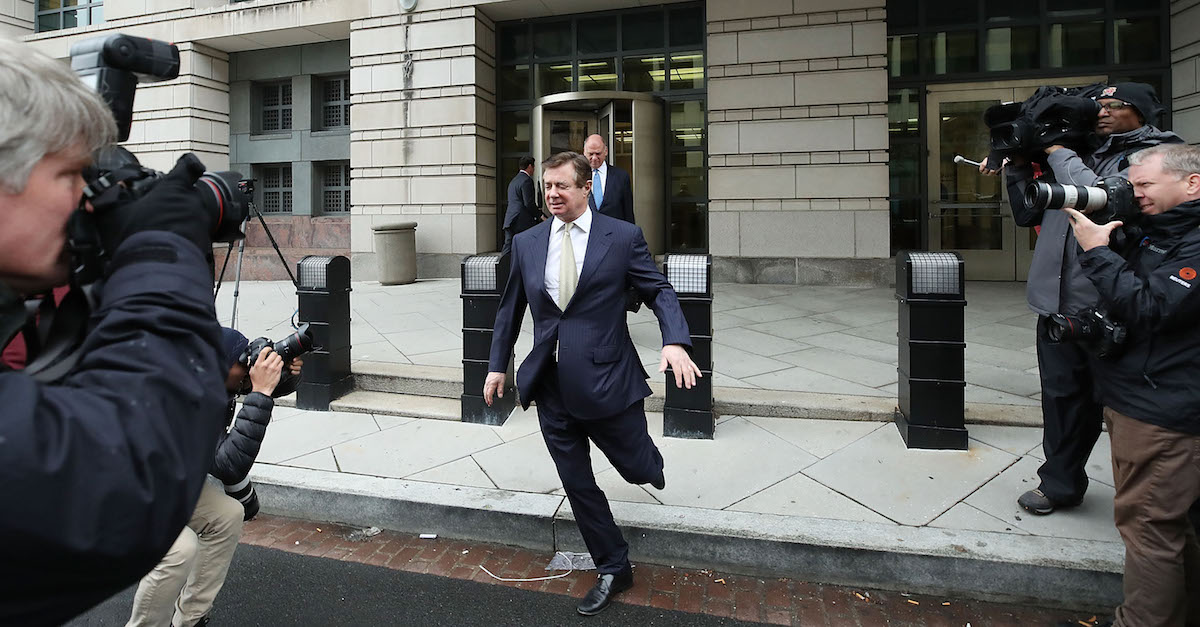
A New York judge on Wednesday morning “hastily dismissed” state mortgage fraud charges against onetime Trump 2016 campaign chairman Paul Manafort–paving the way for a presidential pardon.
Manhattan Supreme Justice Maxwell Wiley tossed the 16-count indictment against Manafort without discussion or explanation during a hearing which reportedly lasted all of 90 seconds.
The dismissal comes as an implicit rebuke of Manhattan District Attorney (DA) Cyrus Vance, Jr., who had prosecuted Manafort in an effort to ensure that President Donald Trump would not be able to pardon the disgraced Republican lobbyist.
Manafort was previously convicted of multiple federal crimes related to essentially the same set of facts that led to his New York State charges. A president, however, can only pardon federal crimes. State crimes are outside the purview of the president’s pardon power.
New York State legislators and Governor Andrew Cuomo aided Vance in his efforts by recently passing a law, S4572, which closed the so-called “Double Jeopardy loophole.” The law was more or less tailor made to accommodate a second slate of charges against Manafort.
Titled “Previous Prosecution: Presidential Reprieve, Pardon, or Other Form of Clemency,” the law permits prosecutors to bring charges against “a person [who] has been granted a reprieve, pardon or other form of clemency for an offense,” if authorities can show a potential defendant has a clear conflict of interest with the president.
Examples of such conflicts include: a current or former staff member; a current or former political appointee; or a family member related to the president by blood or by marriage “within the sixth degree.”
“With the President all but pledging to corruptly abuse his pardon power to allow friends and associates off the hook, it is crucial that we have closed the Double Jeopardy loophole and preserved the rule of law in New York,” New York State Senator Todd Kaminsky said in a press release at the time of the law’s passage.
Under the terms of that recently-enacted law, however, Manafort would have to be pardoned or receive some other form of clemency–such as sentence commutation–before prosecutors could refile charges without running afoul of the Empire State’s constitutional protections against Double Jeopardy prosecution.
Manafort’s attorneys previously blasted Vance over the charges:
Mere minutes after Mr. Manafort’s second federal sentencing, the District Attorney—delivering a statement that was as much campaign speech as public announcement—proclaimed the indisputable principle that “[n]o one is beyond the law in New York.” Regrettably, he neither advertised nor adhered to the equally indisputable principle that no one is below the law in New York. Mr. Manafort is entitled to the equal protection of New York’s double jeopardy statute, which permits no exceptions for defendants who have garnered national interest, nor for favored political causes of the elected district attorney.
“In our view, the laws of New York will not allow the People do what they did in this case,” Manafort’s attorney Todd Blanche told an assemblage of reporters at his client’s arraignment last summer. For the time, it appears, Blanche was correct.
The Manhattan DA’s office has previously signaled any such ruling will be appealed. Vance’s spokesperson Danny Frost confirmed exactly that minutes after the case was dismissed.
Vance’s failed move against Manafort, highly criticized by criminal defense attorneys and civil liberties advocates, was widely interpreted as a transparent bid to maintain his own power after a series of scandals called into question his fealty to equal justice.
Vance was the subject of vociferous criticism and allegations of pay-to-play justice over his past decisions to shutter investigations into Harvey Weinstein, Ivanka Trump and Donald Trump Jr.–after Vance himself received several hefty campaign contributions from their lawyers. Vance’s office also played a role in the Jeffrey Epstein case.
[image via Mark Wilson/Getty Images]